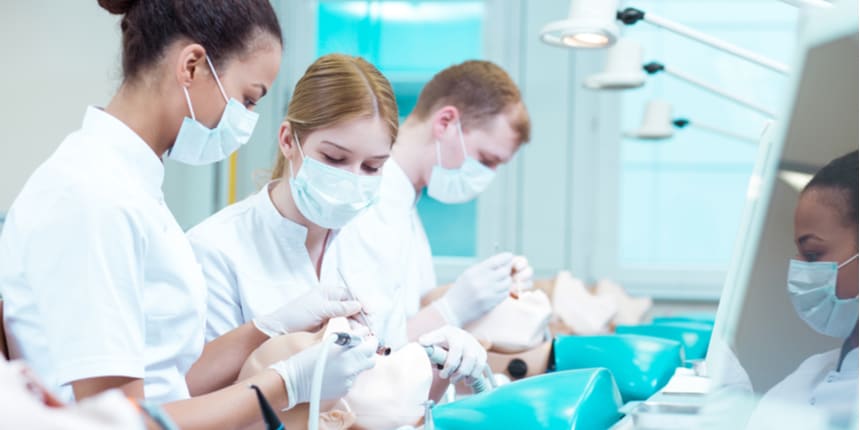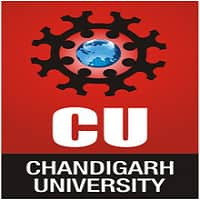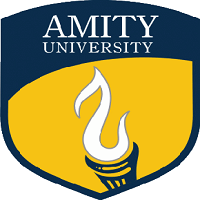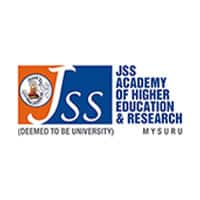Amrita Vishwa Vidyapeetham Allied & Life Science 2025
Admissions Open for multiple allied and health sciences programs across 5 campuses | Ranked #7 in India by NIRF, NAAC A++ Accredited
Dentistry is a popular medical field focused on diagnosing, treating, and preventing oral health issues. Apart from MBBS, there are several dental courses available after class 12th that do not require the NEET exam. To become a dentist, most students pursue a bachelor’s or master’s degree in dentistry and then work in private practices or public healthcare centres.

In India, dentistry ranks as the second most popular medical course after MBBS. These dental courses after 12th prepare students to practice dentistry either independently or under hospital supervision. The courses cover the diagnosis and treatment of conditions affecting the teeth, tongue, and jaw, and they do not require NEET.
This article lists various dental courses available after 12th, including the eligibility requirements, course duration, and top colleges offering these programmes. For eligibility, students typically need to have completed 12th grade with subjects like Physics, Chemistry, and Biology (PCB).
Several dental courses offer excellent career opportunities and help students build strong knowledge in the field. The following table highlights the top five dental courses after 12th, including their eligibility criteria and the colleges that offer these programmes. These courses provide students with the skills needed for a successful career.
Admissions Open for multiple allied and health sciences programs across 5 campuses | Ranked #7 in India by NIRF, NAAC A++ Accredited
| Course | Eligilibity Criteria | Colleges |
|---|---|---|
Class 12 with a minimum of 50 per cent marks in Science (PCB) | KGMU- Lucknow, MAIDS- Delhi, IMS- Varanasi, Government Dental College and Hospital- Mumbai. | |
BSc Dental Technology | Same as above | Om Sterling Global University- Hisar, Yenepoya School of Allied Health Sciences- Mangaluru |
Diploma in Dental Assistant | Same as above | Bir Tikendrajit University- Imphal and YBN University- Ranchi |
Diploma in Dental Hygiene | Same as above | Government Dental College and Hospital- Mumbai, KVG Dental College and Hospital- Sullia, RDC Chennai |
Integrated Dental Photography Certificate Course | Enrolment in BDS without NEET |
Here are the details of each dental course, including its duration. These courses cover a wide range of dental fields, from basic dental assistant training to advanced specialisations like BDS. Each programme provides students with the necessary skills and knowledge for a successful career in the field of dentistry.
In India, BDS is the only recognised professional dental course, required for students who wish to work as dentists in private or government hospitals. This course focuses on dental sciences and procedures and lasts five years, consisting of four years of classroom instruction and one year of mandatory rotating internship.
Fees for this course can range from Rs 15,000 to Rs 15 Lakhs. The BDS programme is essential for those who are aiming to practise dentistry independently or under supervision.
BDS Course Duration: This is a five-year undergraduate programme.
Also Check: Top B.D.S. Colleges in India
Students can learn all the laboratory procedures in dentistry through this course after class 12th. They will also be trained to use modern dental technologies and treatment methods. Although it is one of the lesser-known dental courses after 12th in India, it provides important skills for a career in dentistry.
BSc Dental Technology Duration: This is a three-year degree programme.
Also Check: Top Dentistry Colleges in India
Students who wish to work as dental assistants should pursue such dental diploma courses after 12th. A dental assistant is responsible for ensuring that all required precautions are followed before, during, and after dental treatment to ensure a smooth and effective process.
This diploma in dental after 12th teaches students that they must make sure that all medical equipment is sterile and in good operating order.
Diploma in Dental Assistant Duration: This is a two-year diploma programme
This diploma after the 12th teaches students about oral hygiene and preventive dentistry. They will become experts in oral health, learning to assess, diagnose, and treat issues like gum diseases, tooth problems, jaw injuries, and other dental complications. It prepares them for a career in dental care and patient health management.
Duration: This is a two-year dental diploma programme
Photography has become an important skill for dentists. It is used for educational purposes, in journals, briefings, and treatment decisions. It also serves in medico-legal matters, laboratory communication, forensic investigations, and as a marketing tool.
Anyone can take a photo, but understanding how to capture high-quality images with the right angles is important. Dentists must also be able to quickly organise and use the photos for effective treatment planning and communication, which saves time and improves patient results. This skill has become necessary in modern dental practices.
Duration: This is a four-month certificate course
Students who complete dental courses after class 12th can find work in companies that manufacture dental implants and materials. They can also explore different career opportunities in the dental field. These roles allow graduates to contribute to oral healthcare and work in various environments, including private practices and public health centres.
Here are some of the well-known job profiles that graduates can apply for:
Dentists with the right qualifications have many career opportunities. They can work in government hospitals, private clinics, or even teach at educational institutions. Some dentists also start their practice for more independence and control over their work. Here are some of the key points:
Dentistry is a promising field with diverse career options. After completing dental courses, graduates can work in hospitals, and clinics, or even run their practice. With further studies, they can also pursue teaching roles. Overall, it offers a fulfilling career with great earning potential and growth opportunities.
Popular dental courses after 12th are Bachelor’s in Dental Surgery, BSc Dental Technology, Diploma in Dental Assistant, Diploma in Dental Hygienist, and Integrated Dental Photography Certificate Course.
Students who complete these courses earn around Rs. 3-6 LPA, depending on the course pursued and skillset.
Some well-known job profiles that graduates can apply for include dentists, dental surgeons, professors, dental consultants, dental hygienists, cosmetic dentists, technicians in dental laboratories.
Four years of classroom instruction and one year of mandatory rotating internship make up the five-year curriculum of the BDS course.
Students must have completed class 12 with Science subjects (PCB) with a minimum of 50 per cent marks.
BDS stands for Bachelor’s in Dental Surgery and it is an undergraduate programme of five years.
Yes, aspirants of BDS programmes need to appear and pass the NEET entrance exam for admission. However, diploma-level courses in dentistry do not require one to pass the NEET exam.
Salary after BDS depends on the experience, skills, and location of the job. However, the average BDS salary is Rs. 24,000 - Rs. 36,000 per month for freshers, according to the Glassdoor.
BDS are dental surgeons and can use "Doctor" in front of their names, however, their job role is different from MBBS.
Yes, BDS can perform surgery but only related to dentistry.
The bsc Agriculture courses fee per year in India vary depending on the types of colleges I mean:-
1. Government Colleges:-
. fees rs 5000 to 40000 per year
Examples: BHU, PJTSAU, ANGRAU, TNAU, OUAT etc
2. Private Colleges:-
fees: Rs. 50000 to rs 2,50,000 per year
Examples: Amity University, Lovely Professonal University, Shrada University etc.
fees include tution, hostel and other charges.
Average Duration:- 4 years
Thanks!
Dear Sourabh,
Institutes accepting JEE Main for Integrated CS/AI/DS Programs
1. IIIT- Hyderabad
2. IIIT- Delhi
3. Central Universities (like CUJ, CUH, etc.)
4. Private Universities like Ashoka University, Shiv Nadar University etc.
Hope you get it!
25K rank for general category is a good rank for getting into BSE nursing ,BSE anaesthesia ,OT Tech ,MLT,BPT, especially understate Kota. You may not get AIIMS/central seats, but government and top private options are well within reach..
Indian colleges might offer admissions to people who have scored below 30,000 in JEE Main.
1. NITs (National Institutes of Technology)
2. IIITs (Indian Institutes of Information Technology)
3. GFTIs (Government Funded Technical Institutes)
Certain colleges and courses are available for these programs.
- NIT Jalandhar (Chemical Engineering)
- NIT Jaipur (Civil Engineering)
- IIIT Kancheepuram (Smart Manufacturing)
- IIIT Tiruchirappalli (Electronics and Communication Engineering)
BSC Paramedical program
First year fee:65,000
Total fee for the four year course: 2.6 lakhs
The Institute of various BSc specialisation Such as
Orthotists and Prosthetists are professionals who provide aid to patients with disabilities. They fix them to artificial limbs (prosthetics) and help them to regain stability. There are times when people lose their limbs in an accident. In some other occasions, they are born without a limb or orthopaedic impairment. Orthotists and prosthetists play a crucial role in their lives with fixing them to assistive devices and provide mobility.
A pathologist diagnoses diseases by examining body fluids, tissues, and organs. They perform tests, microscopic analysis, and autopsies to identify abnormalities and causes of illness. Working mainly in hospitals and labs, they collaborate with doctors to guide treatment. The field offers growing career opportunities in clinical practice, research, and education due to rising demand for diagnostic services.
A Veterinary Doctor diagnoses, treats, and prevents diseases in animals. They perform surgeries, advise on nutrition, and guide animal care and breeding. To become one in India, students must complete a Bachelor’s in Veterinary Science (B.V.Sc) after studying Physics, Chemistry, and Biology in Class 12. The role combines medical expertise with compassion for animal welfare.
A Speech Therapist (Speech-Language Pathologist) diagnoses and treats speech, language, communication, and swallowing disorders across all ages. They work in hospitals, schools, clinics, and more. Becoming an SLP requires a master’s degree, clinical training, and certification. With rising demand, the career offers rewarding opportunities in therapy, education, and research.
A gynaecologist is a medical specialist in women’s reproductive health, handling issues like menstruation, fertility, pregnancy, and childbirth. They perform exams, surgeries, and offer family planning services. To become one, students must complete MBBS and postgraduate training. Gynaecologists work in hospitals or clinics and are in high demand, with salaries growing significantly with experience.
The audiologist career involves audiology professionals who are responsible to treat hearing loss and proactively preventing the relevant damage. Individuals who opt for a career as an audiologist use various testing strategies with the aim to determine if someone has a normal sensitivity to sounds or not. After the identification of hearing loss, a hearing doctor is required to determine which sections of the hearing are affected, to what extent they are affected, and where the wound causing the hearing loss is found. As soon as the hearing loss is identified, the patients are provided with recommendations for interventions and rehabilitation such as hearing aids, cochlear implants, and appropriate medical referrals. While audiology is a branch of science that studies and researches hearing, balance, and related disorders.
An oncologist is a medical doctor who diagnoses and treats cancer using chemotherapy, radiation, surgery, and other therapies. They work with a team to create treatment plans tailored to each patient. Specialisations include medical, surgical, radiation, pediatric, gynecologic, and hematologic oncology. Becoming an oncologist in India requires an MBBS and postgraduate studies in oncology.
A biochemist studies the chemical processes within living organisms, combining chemistry and biology. They conduct experiments, analyse data, and develop products like drugs and vaccines. Biochemists work in labs, healthcare, research, and education. A degree in biochemistry or related fields is essential, with advanced roles often requiring higher degrees. They also ensure quality control and may teach or mentor others.
A Narcotics Officer investigates drug use, tracks traffickers, and conducts undercover operations to arrest dealers. They collaborate with government agencies at borders and work with NGOs to raise awareness about drug abuse. This vital role helps reduce illegal activities, making communities safer and limiting the spread of drugs. If you’re committed to law enforcement, this career could be your path.
A Research Associate supports scientists by designing and conducting experiments, collecting and analyzing data, and preparing reports. They ensure research follows ethical guidelines and collaborate with teams. Typically working in labs or research institutions, they start with a salary around Rs. 35,000 monthly, growing with experience. Career growth can lead to senior research or scientist roles.
A Biotechnologist is a professional who possesses strong knowledge and techniques that are utilised in creating and developing innovative products that improve the quality of human life standards. A biochemist uses biological organisms to create and improve goods and procedures for agriculture, medicine, and sustainability. He or she researches the genetic, chemical, and physical characteristics of cells, tissues, and organisms to determine how they can be used industrially.
A career as Research and Development (R&D) Personnel involves innovating and improving products or technologies through scientific work, experiments, and analysis. They design models, manage projects, and support technical and administrative tasks. Typically requiring a relevant engineering degree, this role demands strong analytical, problem-solving, and communication skills, ideal for those passionate about innovation and scientific discovery.
A Drug Inspector ensures the quality and safety of medicines by inspecting pharmaceuticals throughout the production, distribution, and sale processes. They ensure drugs meet health standards, preventing unsafe or substandard medicines from reaching consumers. Drug Inspectors are responsible for monitoring compliance with regulations, conducting inspections, and ensuring that products meet required safety and efficacy standards.

NAAC A+ Grade | Ranked No.1 Private University in India (QS World University Rankings 2025)

Ranked #1 Among all Private Indian Universities in QS Asia Rankings 2025 | Scholarships worth 210 CR

Ranked amongst top 3% universities globally (QS Rankings)

NAAC A+ Accredited| Ranked #24 in University Category by NIRF | Applications open for multiple UG & PG Programs
Admissions Open 2025
Beyond MBBS: Discover New Doors in Healthcare | Apply for UG in Health Sciences | Pharmacy | Nursing | Physiotherapy | Public Health | Occupational Therapy